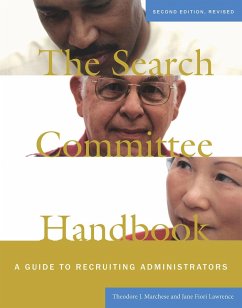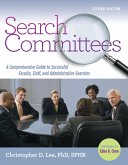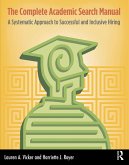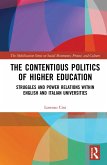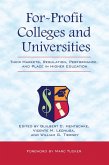Theodore J. Marchese, Jane Fiori Lawrence
The Search Committee Handbook (eBook, ePUB)
A Guide to Recruiting Administrators
23,95 €
23,95 €
inkl. MwSt.
Sofort per Download lieferbar

12 °P sammeln
23,95 €
Als Download kaufen

23,95 €
inkl. MwSt.
Sofort per Download lieferbar

12 °P sammeln
Jetzt verschenken
Alle Infos zum eBook verschenken
23,95 €
inkl. MwSt.
Sofort per Download lieferbar
Alle Infos zum eBook verschenken

12 °P sammeln
Theodore J. Marchese, Jane Fiori Lawrence
The Search Committee Handbook (eBook, ePUB)
A Guide to Recruiting Administrators
- Format: ePub
- Merkliste
- Auf die Merkliste
- Bewerten Bewerten
- Teilen
- Produkt teilen
- Produkterinnerung
- Produkterinnerung

Bitte loggen Sie sich zunächst in Ihr Kundenkonto ein oder registrieren Sie sich bei
bücher.de, um das eBook-Abo tolino select nutzen zu können.
Hier können Sie sich einloggen
Hier können Sie sich einloggen
Sie sind bereits eingeloggt. Klicken Sie auf 2. tolino select Abo, um fortzufahren.

Bitte loggen Sie sich zunächst in Ihr Kundenkonto ein oder registrieren Sie sich bei bücher.de, um das eBook-Abo tolino select nutzen zu können.
* Reviews of the first edition:"Finally, higher education has an intelligent guide for recruiting administrators--an activity often taken for granted and not always thoughtfully carried out.
- Geräte: eReader
- mit Kopierschutz
- eBook Hilfe
Andere Kunden interessierten sich auch für
![Job Search In Academe (eBook, ePUB) Job Search In Academe (eBook, ePUB)]() Dawn M. FormoJob Search In Academe (eBook, ePUB)24,95 €
Dawn M. FormoJob Search In Academe (eBook, ePUB)24,95 €![Search Committees (eBook, ePUB) Search Committees (eBook, ePUB)]() Christopher D. LeeSearch Committees (eBook, ePUB)33,95 €
Christopher D. LeeSearch Committees (eBook, ePUB)33,95 €![The Complete Academic Search Manual (eBook, ePUB) The Complete Academic Search Manual (eBook, ePUB)]() Lauren A. VickerThe Complete Academic Search Manual (eBook, ePUB)25,95 €
Lauren A. VickerThe Complete Academic Search Manual (eBook, ePUB)25,95 €![The Contentious Politics of Higher Education (eBook, ePUB) The Contentious Politics of Higher Education (eBook, ePUB)]() Lorenzo CiniThe Contentious Politics of Higher Education (eBook, ePUB)44,95 €
Lorenzo CiniThe Contentious Politics of Higher Education (eBook, ePUB)44,95 €![For-Profit Colleges and Universities (eBook, ePUB) For-Profit Colleges and Universities (eBook, ePUB)]() For-Profit Colleges and Universities (eBook, ePUB)30,95 €
For-Profit Colleges and Universities (eBook, ePUB)30,95 €![The Crisis of Campus Sexual Violence (eBook, ePUB) The Crisis of Campus Sexual Violence (eBook, ePUB)]() The Crisis of Campus Sexual Violence (eBook, ePUB)47,95 €
The Crisis of Campus Sexual Violence (eBook, ePUB)47,95 €![Establishing an Experimental Community College in the United States (eBook, ePUB) Establishing an Experimental Community College in the United States (eBook, ePUB)]() Chet JordanEstablishing an Experimental Community College in the United States (eBook, ePUB)17,95 €
Chet JordanEstablishing an Experimental Community College in the United States (eBook, ePUB)17,95 €-
-
-
* Reviews of the first edition:"Finally, higher education has an intelligent guide for recruiting administrators--an activity often taken for granted and not always thoughtfully carried out.
Dieser Download kann aus rechtlichen Gründen nur mit Rechnungsadresse in A, B, BG, CY, CZ, D, DK, EW, E, FIN, F, GR, HR, H, IRL, I, LT, L, LR, M, NL, PL, P, R, S, SLO, SK ausgeliefert werden.
Produktdetails
- Produktdetails
- Verlag: Taylor & Francis eBooks
- Seitenzahl: 96
- Erscheinungstermin: 3. Juli 2023
- Englisch
- ISBN-13: 9781000970876
- Artikelnr.: 68357007
- Verlag: Taylor & Francis eBooks
- Seitenzahl: 96
- Erscheinungstermin: 3. Juli 2023
- Englisch
- ISBN-13: 9781000970876
- Artikelnr.: 68357007
- Herstellerkennzeichnung Die Herstellerinformationen sind derzeit nicht verfügbar.
Theodore J. Marchese is Senior Consultant at the Academic Search Consultation Service. He served as Vice President of the American Association for Higher Education and as Executive Editor of Change magazine. Jane Fiori Lawrence is Vice Chancellor for Student Affairs at the University of California, Merced.
Introduction; 1 The Vacancy. An Organizational Opportunity. Campus leaders
know that nothing they do is more important than to recruit, nurture, and;
advance the talents of line managers and administrative staff, who make
their college or university work. When an administrative vacancy occurs,
they see it as a dual opportunity for their institution. first to rethink a
function-the role and goals of a position, and the character of; person
needed to make it work-then to make an appointment that helps to achieve
them; 2 The Committee. Composition, Charge, and Ground Rules. In this we
assume that the institution has completed the work outlined in 1, has a
good sense of what it wants from a search, and will appoint a committee to
conduct it. We now address issues that confront the appointing officer as
he or she gathers and charges a committee, then raise matters the officer
and committee will weigh together to get the search off to a good start.; 3
The Job. Identifying Preferred Qualifications. The search committee now has
its charge plus a good sense of itself, its calendar, and its terms; of
work. It is ready for its initial substantive task of search. to determine
as precisely as possible; what it will search for.; 4 The Search.
Recruiting a Candidate Pool. An injunction heard from every search veteran
we spoke with was that "committees have to; undertake active search,"
meaning vigorous recruitment. We're not sure who exactly advocates;
"passive search" (an oxymoron), but the behavior proscribed is clear
enough. the hapless search; committee that says at the start, "Let's place
an ad and see what comes in."; 5 The Screening. Identifying Talent among
Applicants. As the date for application review arrives, a week of intensive
reading lies ahead for the committee. Members will now cull through what
seem daunting piles of application materials to locate candidates of
highest promise. In this , we show how the committee can screen; a
hypothetical set of 60 applications down to 6 or 8. It's a task that
demands care. These are choices about real people, with candidates and your
campus alike trusting your judgment.; 6 The Interviews. Knowing and
Courting Candidates. This longest of the Handbook's s will help your search
committee work through an; important set of next questions. how to
interview your remaining candidates, how many to; bring to campus, how to
structure those visits for mutual learning, and how to complete your
evaluation of the finalists. By 's end, the committee should have gathered
all the information it needs to proceed with recommendations to the
appointing officer.; 7 Making the Appointment. At long last the committee
is ready to realize the main point of its work. the recommendation of;
candidates to the appointing officer. That officer in turn will need to
weigh, offer, negotiate, and; conclude an appointment. All parties then
need to bring that appointee into the institution and; position in ways
that set him or her up for success; Web Sites, Resources, and Associations;
Annotated Bibliography; Acknowledgments; Advisory Board; About the Authors;
Index.
know that nothing they do is more important than to recruit, nurture, and;
advance the talents of line managers and administrative staff, who make
their college or university work. When an administrative vacancy occurs,
they see it as a dual opportunity for their institution. first to rethink a
function-the role and goals of a position, and the character of; person
needed to make it work-then to make an appointment that helps to achieve
them; 2 The Committee. Composition, Charge, and Ground Rules. In this we
assume that the institution has completed the work outlined in 1, has a
good sense of what it wants from a search, and will appoint a committee to
conduct it. We now address issues that confront the appointing officer as
he or she gathers and charges a committee, then raise matters the officer
and committee will weigh together to get the search off to a good start.; 3
The Job. Identifying Preferred Qualifications. The search committee now has
its charge plus a good sense of itself, its calendar, and its terms; of
work. It is ready for its initial substantive task of search. to determine
as precisely as possible; what it will search for.; 4 The Search.
Recruiting a Candidate Pool. An injunction heard from every search veteran
we spoke with was that "committees have to; undertake active search,"
meaning vigorous recruitment. We're not sure who exactly advocates;
"passive search" (an oxymoron), but the behavior proscribed is clear
enough. the hapless search; committee that says at the start, "Let's place
an ad and see what comes in."; 5 The Screening. Identifying Talent among
Applicants. As the date for application review arrives, a week of intensive
reading lies ahead for the committee. Members will now cull through what
seem daunting piles of application materials to locate candidates of
highest promise. In this , we show how the committee can screen; a
hypothetical set of 60 applications down to 6 or 8. It's a task that
demands care. These are choices about real people, with candidates and your
campus alike trusting your judgment.; 6 The Interviews. Knowing and
Courting Candidates. This longest of the Handbook's s will help your search
committee work through an; important set of next questions. how to
interview your remaining candidates, how many to; bring to campus, how to
structure those visits for mutual learning, and how to complete your
evaluation of the finalists. By 's end, the committee should have gathered
all the information it needs to proceed with recommendations to the
appointing officer.; 7 Making the Appointment. At long last the committee
is ready to realize the main point of its work. the recommendation of;
candidates to the appointing officer. That officer in turn will need to
weigh, offer, negotiate, and; conclude an appointment. All parties then
need to bring that appointee into the institution and; position in ways
that set him or her up for success; Web Sites, Resources, and Associations;
Annotated Bibliography; Acknowledgments; Advisory Board; About the Authors;
Index.
Introduction; 1 The Vacancy. An Organizational Opportunity. Campus leaders
know that nothing they do is more important than to recruit, nurture, and;
advance the talents of line managers and administrative staff, who make
their college or university work. When an administrative vacancy occurs,
they see it as a dual opportunity for their institution. first to rethink a
function-the role and goals of a position, and the character of; person
needed to make it work-then to make an appointment that helps to achieve
them; 2 The Committee. Composition, Charge, and Ground Rules. In this we
assume that the institution has completed the work outlined in 1, has a
good sense of what it wants from a search, and will appoint a committee to
conduct it. We now address issues that confront the appointing officer as
he or she gathers and charges a committee, then raise matters the officer
and committee will weigh together to get the search off to a good start.; 3
The Job. Identifying Preferred Qualifications. The search committee now has
its charge plus a good sense of itself, its calendar, and its terms; of
work. It is ready for its initial substantive task of search. to determine
as precisely as possible; what it will search for.; 4 The Search.
Recruiting a Candidate Pool. An injunction heard from every search veteran
we spoke with was that "committees have to; undertake active search,"
meaning vigorous recruitment. We're not sure who exactly advocates;
"passive search" (an oxymoron), but the behavior proscribed is clear
enough. the hapless search; committee that says at the start, "Let's place
an ad and see what comes in."; 5 The Screening. Identifying Talent among
Applicants. As the date for application review arrives, a week of intensive
reading lies ahead for the committee. Members will now cull through what
seem daunting piles of application materials to locate candidates of
highest promise. In this , we show how the committee can screen; a
hypothetical set of 60 applications down to 6 or 8. It's a task that
demands care. These are choices about real people, with candidates and your
campus alike trusting your judgment.; 6 The Interviews. Knowing and
Courting Candidates. This longest of the Handbook's s will help your search
committee work through an; important set of next questions. how to
interview your remaining candidates, how many to; bring to campus, how to
structure those visits for mutual learning, and how to complete your
evaluation of the finalists. By 's end, the committee should have gathered
all the information it needs to proceed with recommendations to the
appointing officer.; 7 Making the Appointment. At long last the committee
is ready to realize the main point of its work. the recommendation of;
candidates to the appointing officer. That officer in turn will need to
weigh, offer, negotiate, and; conclude an appointment. All parties then
need to bring that appointee into the institution and; position in ways
that set him or her up for success; Web Sites, Resources, and Associations;
Annotated Bibliography; Acknowledgments; Advisory Board; About the Authors;
Index.
know that nothing they do is more important than to recruit, nurture, and;
advance the talents of line managers and administrative staff, who make
their college or university work. When an administrative vacancy occurs,
they see it as a dual opportunity for their institution. first to rethink a
function-the role and goals of a position, and the character of; person
needed to make it work-then to make an appointment that helps to achieve
them; 2 The Committee. Composition, Charge, and Ground Rules. In this we
assume that the institution has completed the work outlined in 1, has a
good sense of what it wants from a search, and will appoint a committee to
conduct it. We now address issues that confront the appointing officer as
he or she gathers and charges a committee, then raise matters the officer
and committee will weigh together to get the search off to a good start.; 3
The Job. Identifying Preferred Qualifications. The search committee now has
its charge plus a good sense of itself, its calendar, and its terms; of
work. It is ready for its initial substantive task of search. to determine
as precisely as possible; what it will search for.; 4 The Search.
Recruiting a Candidate Pool. An injunction heard from every search veteran
we spoke with was that "committees have to; undertake active search,"
meaning vigorous recruitment. We're not sure who exactly advocates;
"passive search" (an oxymoron), but the behavior proscribed is clear
enough. the hapless search; committee that says at the start, "Let's place
an ad and see what comes in."; 5 The Screening. Identifying Talent among
Applicants. As the date for application review arrives, a week of intensive
reading lies ahead for the committee. Members will now cull through what
seem daunting piles of application materials to locate candidates of
highest promise. In this , we show how the committee can screen; a
hypothetical set of 60 applications down to 6 or 8. It's a task that
demands care. These are choices about real people, with candidates and your
campus alike trusting your judgment.; 6 The Interviews. Knowing and
Courting Candidates. This longest of the Handbook's s will help your search
committee work through an; important set of next questions. how to
interview your remaining candidates, how many to; bring to campus, how to
structure those visits for mutual learning, and how to complete your
evaluation of the finalists. By 's end, the committee should have gathered
all the information it needs to proceed with recommendations to the
appointing officer.; 7 Making the Appointment. At long last the committee
is ready to realize the main point of its work. the recommendation of;
candidates to the appointing officer. That officer in turn will need to
weigh, offer, negotiate, and; conclude an appointment. All parties then
need to bring that appointee into the institution and; position in ways
that set him or her up for success; Web Sites, Resources, and Associations;
Annotated Bibliography; Acknowledgments; Advisory Board; About the Authors;
Index.
